Important Aspects of Psychosocial Development in Children (2-5 Years)
VerifiedAdded on 2021/02/21
|6
|1663
|51
Essay
AI Summary
This essay delves into the critical aspects of psychosocial development in children between the ages of two and five years. It emphasizes the importance of parental guidance, social environment, and interpersonal relationships in shaping a child's psychological and social growth. The essay references key theorists like Albert Bandura, highlighting the significance of social learning and environmental influences. It also addresses the impact of parental conflicts, divorce, and the role of child care organizations in fostering positive development. Furthermore, the essay underscores the importance of understanding various stages of childhood and the need for tailored care. The essay provides a comprehensive overview of the factors that influence the psychosocial development of children during this crucial period, including normative and non-normative events, and concludes by emphasizing the importance of creating a supportive and healthy social environment for children.
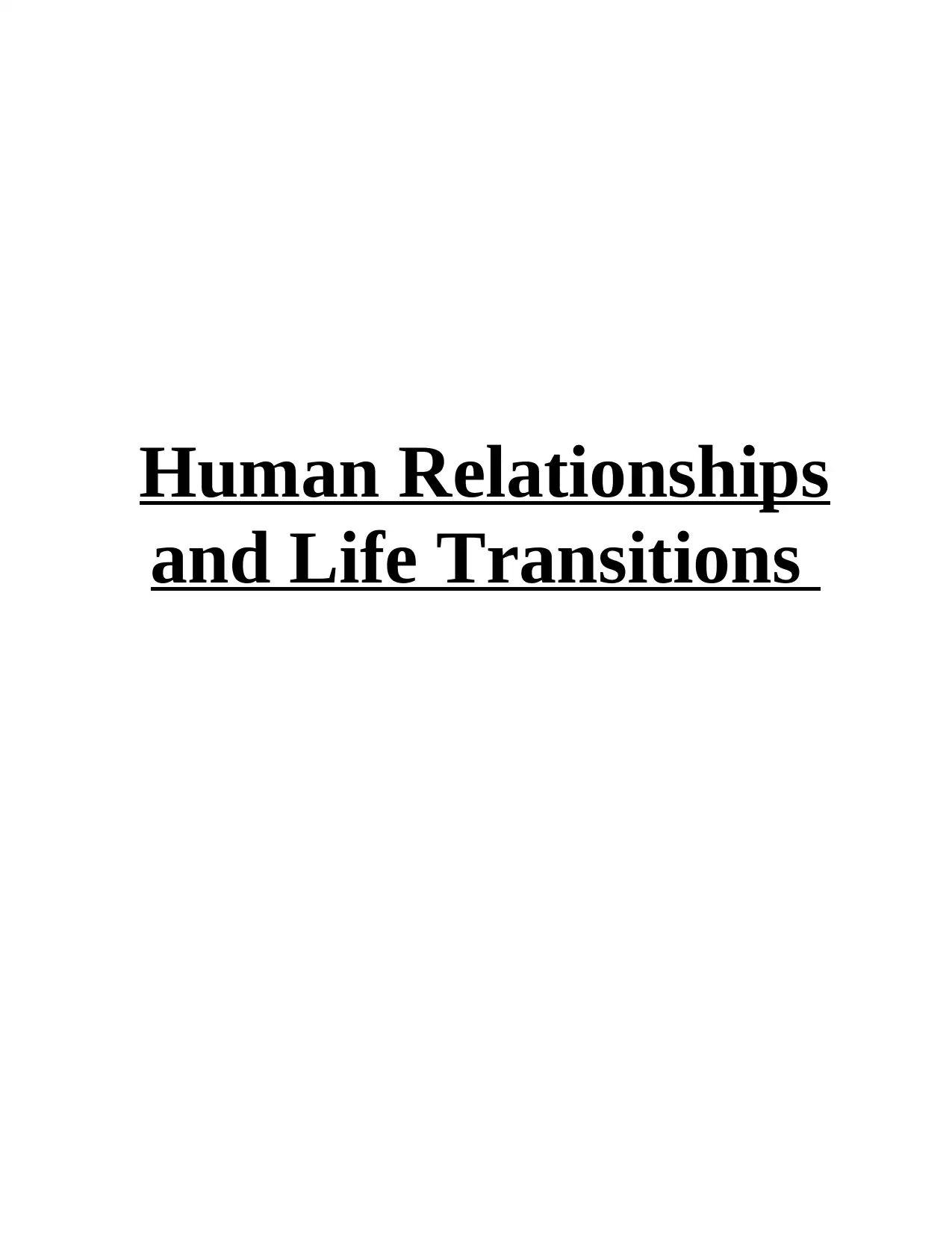
Human Relationships
and Life Transitions
and Life Transitions
Paraphrase This Document
Need a fresh take? Get an instant paraphrase of this document with our AI Paraphraser
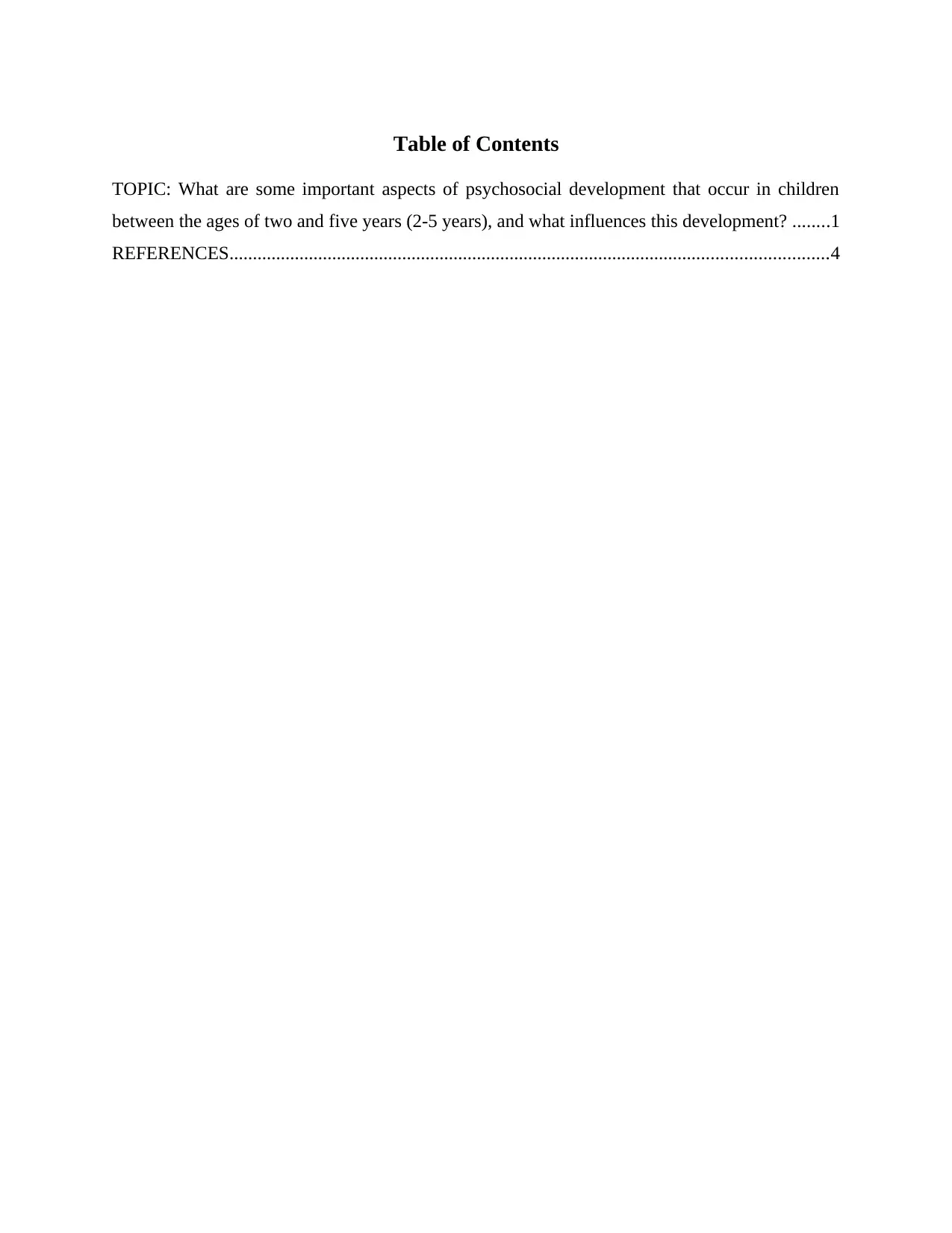
Table of Contents
TOPIC: What are some important aspects of psychosocial development that occur in children
between the ages of two and five years (2-5 years), and what influences this development? ........1
REFERENCES................................................................................................................................4
TOPIC: What are some important aspects of psychosocial development that occur in children
between the ages of two and five years (2-5 years), and what influences this development? ........1
REFERENCES................................................................................................................................4
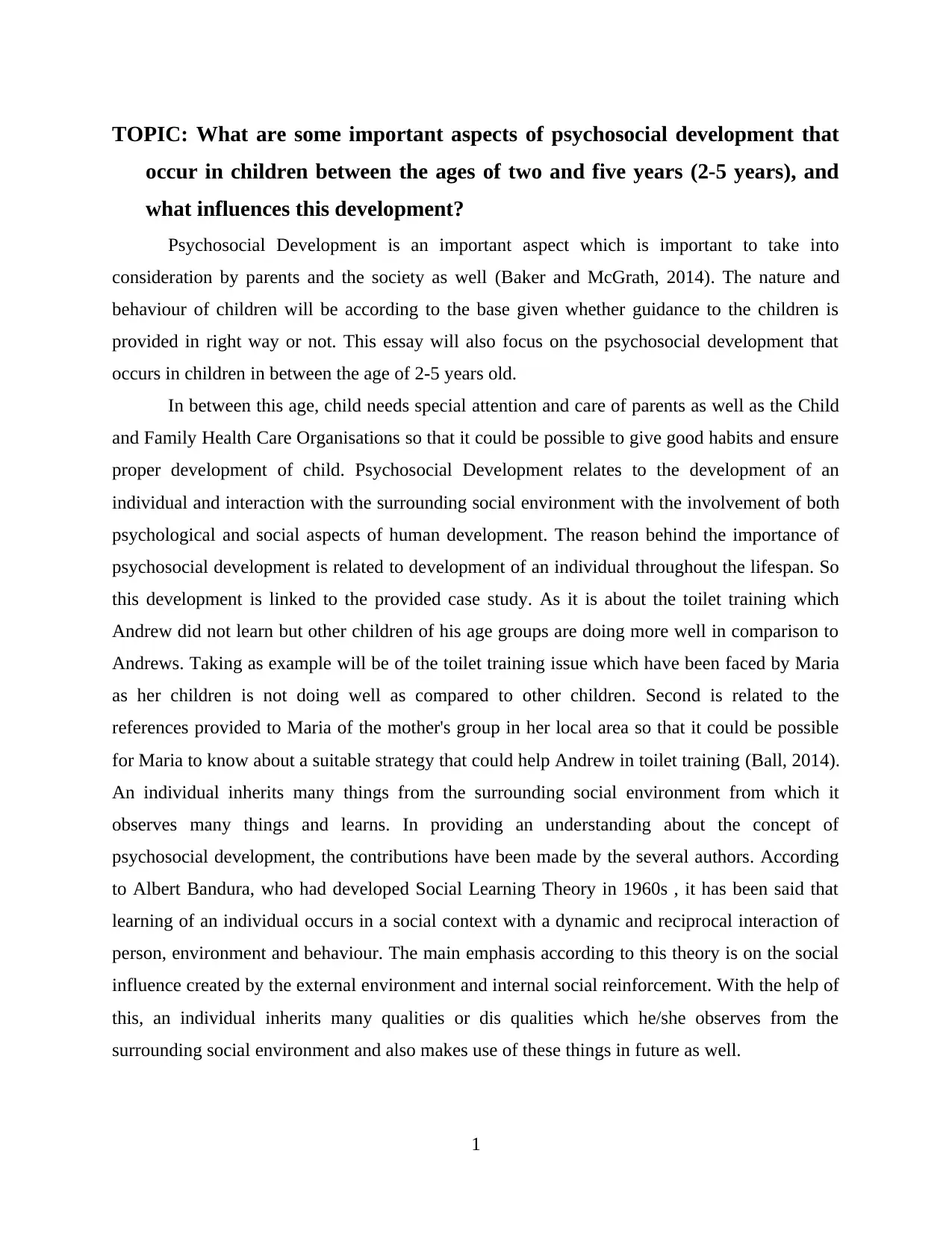
TOPIC: What are some important aspects of psychosocial development that
occur in children between the ages of two and five years (2-5 years), and
what influences this development?
Psychosocial Development is an important aspect which is important to take into
consideration by parents and the society as well (Baker and McGrath, 2014). The nature and
behaviour of children will be according to the base given whether guidance to the children is
provided in right way or not. This essay will also focus on the psychosocial development that
occurs in children in between the age of 2-5 years old.
In between this age, child needs special attention and care of parents as well as the Child
and Family Health Care Organisations so that it could be possible to give good habits and ensure
proper development of child. Psychosocial Development relates to the development of an
individual and interaction with the surrounding social environment with the involvement of both
psychological and social aspects of human development. The reason behind the importance of
psychosocial development is related to development of an individual throughout the lifespan. So
this development is linked to the provided case study. As it is about the toilet training which
Andrew did not learn but other children of his age groups are doing more well in comparison to
Andrews. Taking as example will be of the toilet training issue which have been faced by Maria
as her children is not doing well as compared to other children. Second is related to the
references provided to Maria of the mother's group in her local area so that it could be possible
for Maria to know about a suitable strategy that could help Andrew in toilet training (Ball, 2014).
An individual inherits many things from the surrounding social environment from which it
observes many things and learns. In providing an understanding about the concept of
psychosocial development, the contributions have been made by the several authors. According
to Albert Bandura, who had developed Social Learning Theory in 1960s , it has been said that
learning of an individual occurs in a social context with a dynamic and reciprocal interaction of
person, environment and behaviour. The main emphasis according to this theory is on the social
influence created by the external environment and internal social reinforcement. With the help of
this, an individual inherits many qualities or dis qualities which he/she observes from the
surrounding social environment and also makes use of these things in future as well.
1
occur in children between the ages of two and five years (2-5 years), and
what influences this development?
Psychosocial Development is an important aspect which is important to take into
consideration by parents and the society as well (Baker and McGrath, 2014). The nature and
behaviour of children will be according to the base given whether guidance to the children is
provided in right way or not. This essay will also focus on the psychosocial development that
occurs in children in between the age of 2-5 years old.
In between this age, child needs special attention and care of parents as well as the Child
and Family Health Care Organisations so that it could be possible to give good habits and ensure
proper development of child. Psychosocial Development relates to the development of an
individual and interaction with the surrounding social environment with the involvement of both
psychological and social aspects of human development. The reason behind the importance of
psychosocial development is related to development of an individual throughout the lifespan. So
this development is linked to the provided case study. As it is about the toilet training which
Andrew did not learn but other children of his age groups are doing more well in comparison to
Andrews. Taking as example will be of the toilet training issue which have been faced by Maria
as her children is not doing well as compared to other children. Second is related to the
references provided to Maria of the mother's group in her local area so that it could be possible
for Maria to know about a suitable strategy that could help Andrew in toilet training (Ball, 2014).
An individual inherits many things from the surrounding social environment from which it
observes many things and learns. In providing an understanding about the concept of
psychosocial development, the contributions have been made by the several authors. According
to Albert Bandura, who had developed Social Learning Theory in 1960s , it has been said that
learning of an individual occurs in a social context with a dynamic and reciprocal interaction of
person, environment and behaviour. The main emphasis according to this theory is on the social
influence created by the external environment and internal social reinforcement. With the help of
this, an individual inherits many qualities or dis qualities which he/she observes from the
surrounding social environment and also makes use of these things in future as well.
1
⊘ This is a preview!⊘
Do you want full access?
Subscribe today to unlock all pages.

Trusted by 1+ million students worldwide
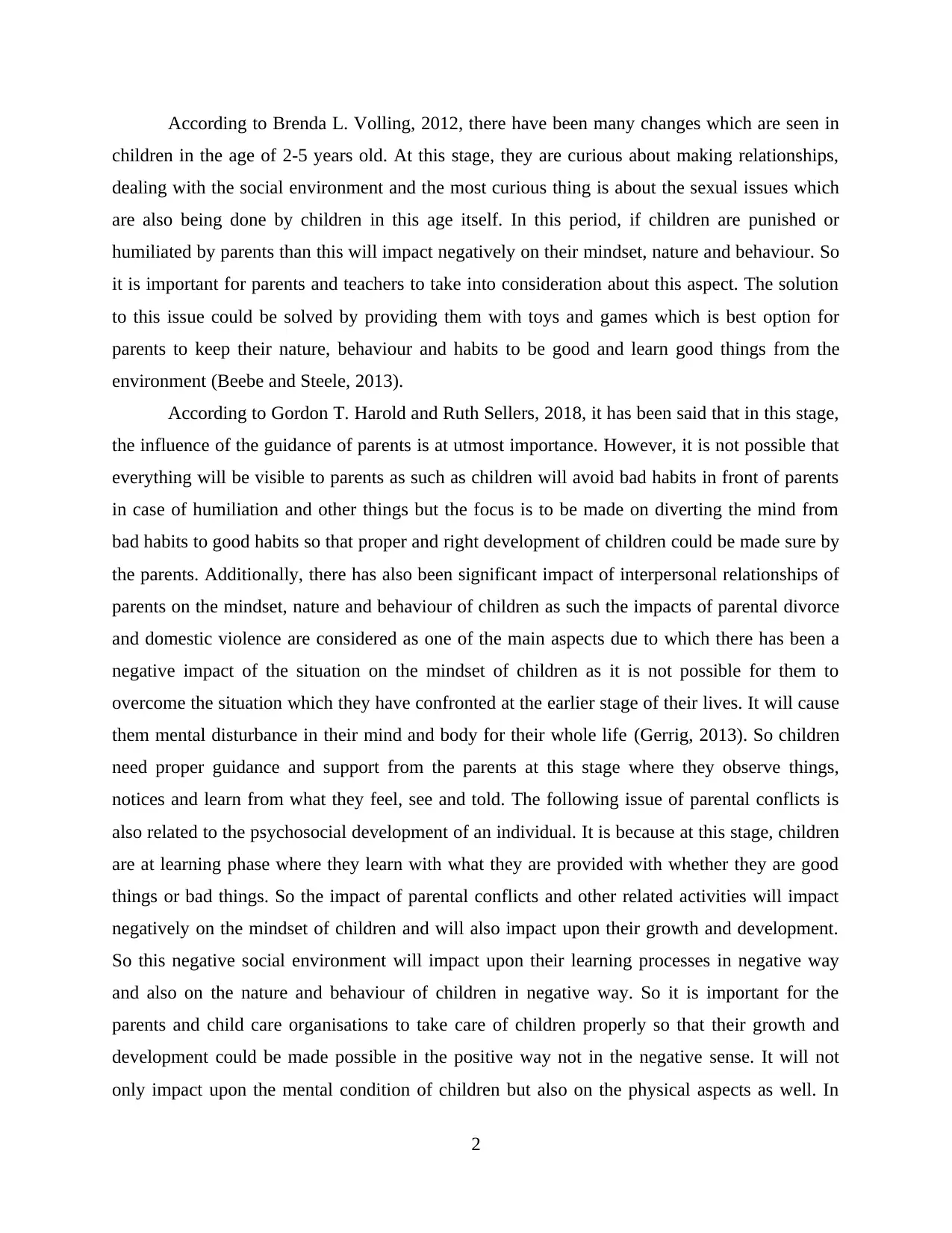
According to Brenda L. Volling, 2012, there have been many changes which are seen in
children in the age of 2-5 years old. At this stage, they are curious about making relationships,
dealing with the social environment and the most curious thing is about the sexual issues which
are also being done by children in this age itself. In this period, if children are punished or
humiliated by parents than this will impact negatively on their mindset, nature and behaviour. So
it is important for parents and teachers to take into consideration about this aspect. The solution
to this issue could be solved by providing them with toys and games which is best option for
parents to keep their nature, behaviour and habits to be good and learn good things from the
environment (Beebe and Steele, 2013).
According to Gordon T. Harold and Ruth Sellers, 2018, it has been said that in this stage,
the influence of the guidance of parents is at utmost importance. However, it is not possible that
everything will be visible to parents as such as children will avoid bad habits in front of parents
in case of humiliation and other things but the focus is to be made on diverting the mind from
bad habits to good habits so that proper and right development of children could be made sure by
the parents. Additionally, there has also been significant impact of interpersonal relationships of
parents on the mindset, nature and behaviour of children as such the impacts of parental divorce
and domestic violence are considered as one of the main aspects due to which there has been a
negative impact of the situation on the mindset of children as it is not possible for them to
overcome the situation which they have confronted at the earlier stage of their lives. It will cause
them mental disturbance in their mind and body for their whole life (Gerrig, 2013). So children
need proper guidance and support from the parents at this stage where they observe things,
notices and learn from what they feel, see and told. The following issue of parental conflicts is
also related to the psychosocial development of an individual. It is because at this stage, children
are at learning phase where they learn with what they are provided with whether they are good
things or bad things. So the impact of parental conflicts and other related activities will impact
negatively on the mindset of children and will also impact upon their growth and development.
So this negative social environment will impact upon their learning processes in negative way
and also on the nature and behaviour of children in negative way. So it is important for the
parents and child care organisations to take care of children properly so that their growth and
development could be made possible in the positive way not in the negative sense. It will not
only impact upon the mental condition of children but also on the physical aspects as well. In
2
children in the age of 2-5 years old. At this stage, they are curious about making relationships,
dealing with the social environment and the most curious thing is about the sexual issues which
are also being done by children in this age itself. In this period, if children are punished or
humiliated by parents than this will impact negatively on their mindset, nature and behaviour. So
it is important for parents and teachers to take into consideration about this aspect. The solution
to this issue could be solved by providing them with toys and games which is best option for
parents to keep their nature, behaviour and habits to be good and learn good things from the
environment (Beebe and Steele, 2013).
According to Gordon T. Harold and Ruth Sellers, 2018, it has been said that in this stage,
the influence of the guidance of parents is at utmost importance. However, it is not possible that
everything will be visible to parents as such as children will avoid bad habits in front of parents
in case of humiliation and other things but the focus is to be made on diverting the mind from
bad habits to good habits so that proper and right development of children could be made sure by
the parents. Additionally, there has also been significant impact of interpersonal relationships of
parents on the mindset, nature and behaviour of children as such the impacts of parental divorce
and domestic violence are considered as one of the main aspects due to which there has been a
negative impact of the situation on the mindset of children as it is not possible for them to
overcome the situation which they have confronted at the earlier stage of their lives. It will cause
them mental disturbance in their mind and body for their whole life (Gerrig, 2013). So children
need proper guidance and support from the parents at this stage where they observe things,
notices and learn from what they feel, see and told. The following issue of parental conflicts is
also related to the psychosocial development of an individual. It is because at this stage, children
are at learning phase where they learn with what they are provided with whether they are good
things or bad things. So the impact of parental conflicts and other related activities will impact
negatively on the mindset of children and will also impact upon their growth and development.
So this negative social environment will impact upon their learning processes in negative way
and also on the nature and behaviour of children in negative way. So it is important for the
parents and child care organisations to take care of children properly so that their growth and
development could be made possible in the positive way not in the negative sense. It will not
only impact upon the mental condition of children but also on the physical aspects as well. In
2
Paraphrase This Document
Need a fresh take? Get an instant paraphrase of this document with our AI Paraphraser
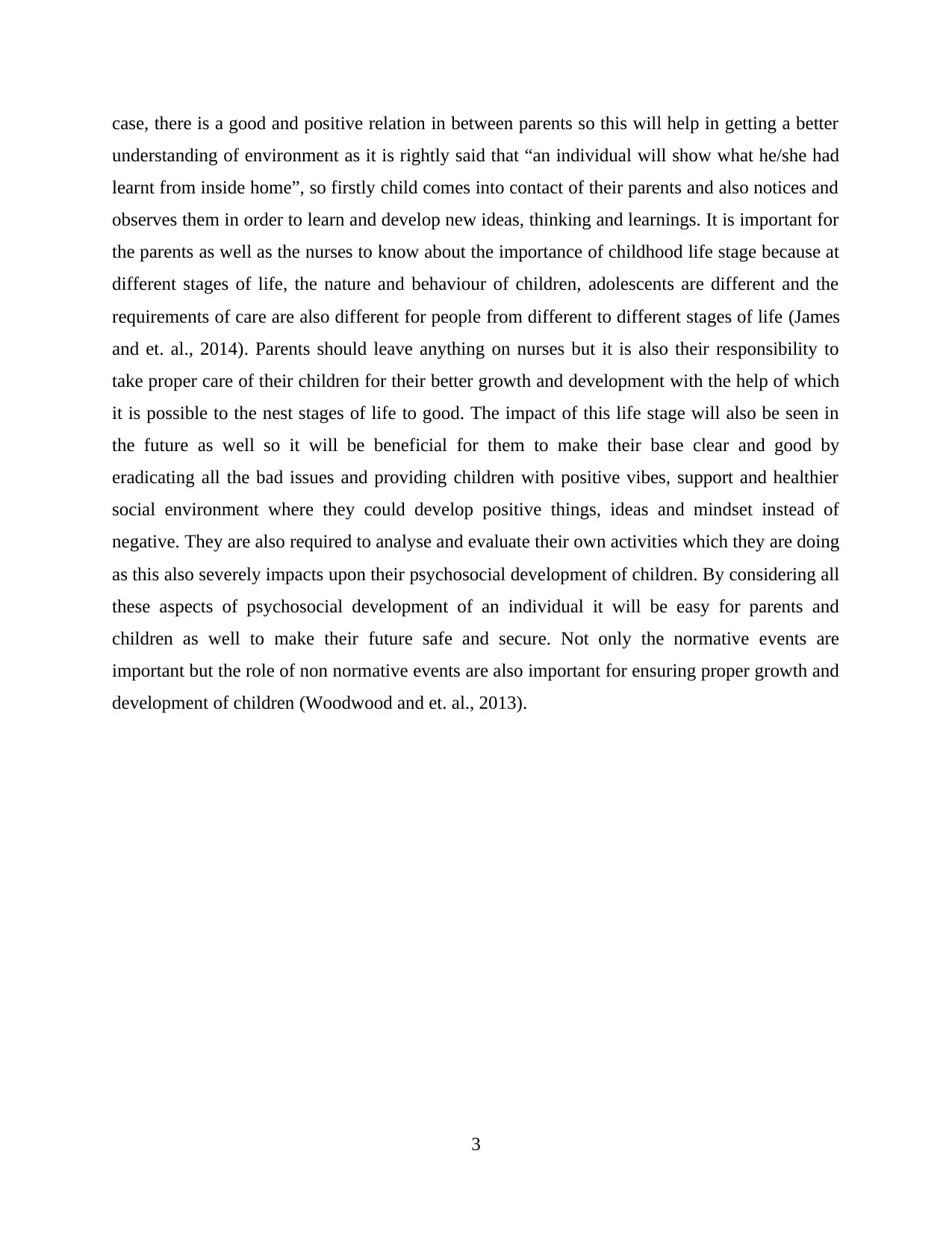
case, there is a good and positive relation in between parents so this will help in getting a better
understanding of environment as it is rightly said that “an individual will show what he/she had
learnt from inside home”, so firstly child comes into contact of their parents and also notices and
observes them in order to learn and develop new ideas, thinking and learnings. It is important for
the parents as well as the nurses to know about the importance of childhood life stage because at
different stages of life, the nature and behaviour of children, adolescents are different and the
requirements of care are also different for people from different to different stages of life (James
and et. al., 2014). Parents should leave anything on nurses but it is also their responsibility to
take proper care of their children for their better growth and development with the help of which
it is possible to the nest stages of life to good. The impact of this life stage will also be seen in
the future as well so it will be beneficial for them to make their base clear and good by
eradicating all the bad issues and providing children with positive vibes, support and healthier
social environment where they could develop positive things, ideas and mindset instead of
negative. They are also required to analyse and evaluate their own activities which they are doing
as this also severely impacts upon their psychosocial development of children. By considering all
these aspects of psychosocial development of an individual it will be easy for parents and
children as well to make their future safe and secure. Not only the normative events are
important but the role of non normative events are also important for ensuring proper growth and
development of children (Woodwood and et. al., 2013).
3
understanding of environment as it is rightly said that “an individual will show what he/she had
learnt from inside home”, so firstly child comes into contact of their parents and also notices and
observes them in order to learn and develop new ideas, thinking and learnings. It is important for
the parents as well as the nurses to know about the importance of childhood life stage because at
different stages of life, the nature and behaviour of children, adolescents are different and the
requirements of care are also different for people from different to different stages of life (James
and et. al., 2014). Parents should leave anything on nurses but it is also their responsibility to
take proper care of their children for their better growth and development with the help of which
it is possible to the nest stages of life to good. The impact of this life stage will also be seen in
the future as well so it will be beneficial for them to make their base clear and good by
eradicating all the bad issues and providing children with positive vibes, support and healthier
social environment where they could develop positive things, ideas and mindset instead of
negative. They are also required to analyse and evaluate their own activities which they are doing
as this also severely impacts upon their psychosocial development of children. By considering all
these aspects of psychosocial development of an individual it will be easy for parents and
children as well to make their future safe and secure. Not only the normative events are
important but the role of non normative events are also important for ensuring proper growth and
development of children (Woodwood and et. al., 2013).
3
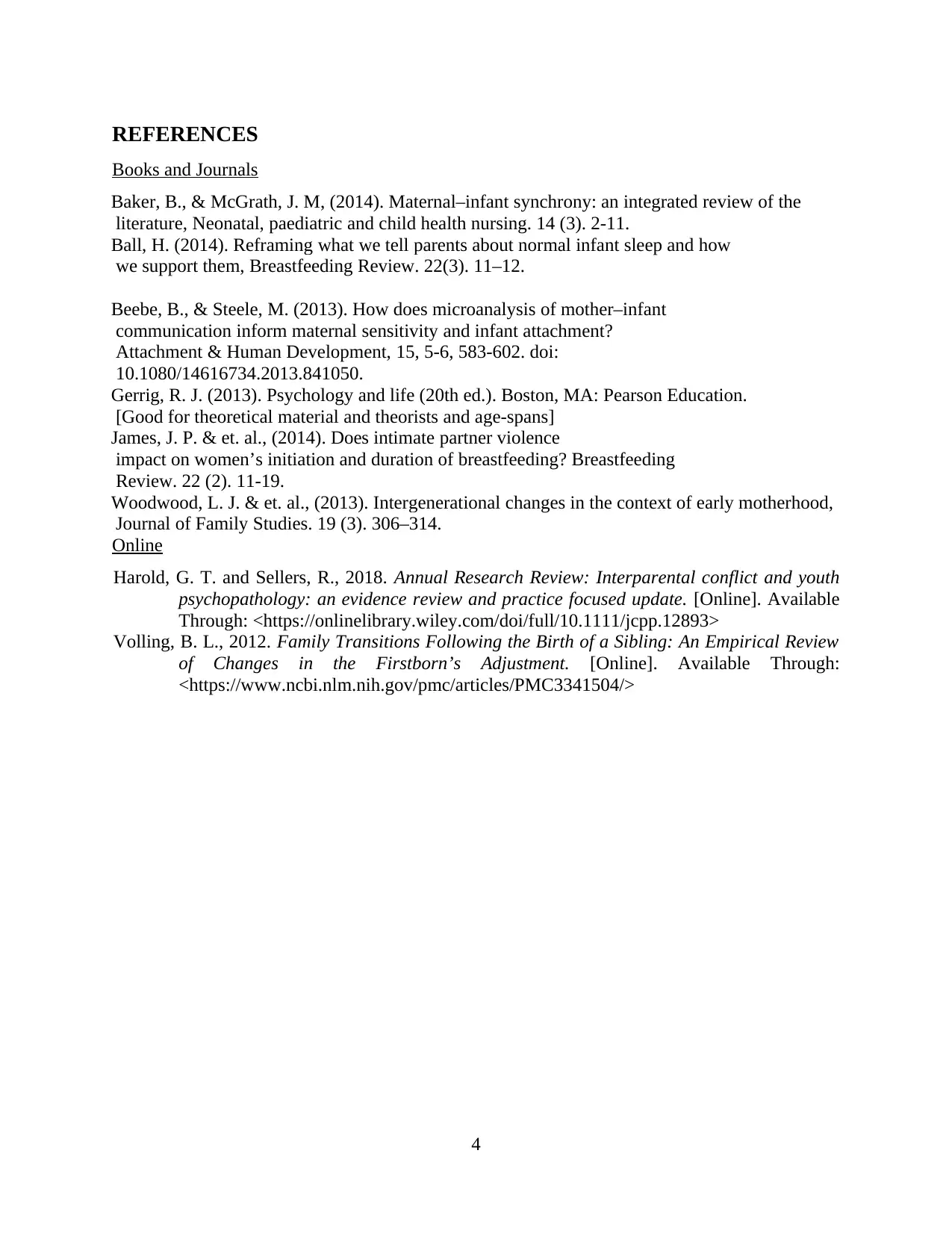
REFERENCES
Books and Journals
Baker, B., & McGrath, J. M, (2014). Maternal–infant synchrony: an integrated review of the
literature, Neonatal, paediatric and child health nursing. 14 (3). 2-11.
Ball, H. (2014). Reframing what we tell parents about normal infant sleep and how
we support them, Breastfeeding Review. 22(3). 11–12.
Beebe, B., & Steele, M. (2013). How does microanalysis of mother–infant
communication inform maternal sensitivity and infant attachment?
Attachment & Human Development, 15, 5-6, 583-602. doi:
10.1080/14616734.2013.841050.
Gerrig, R. J. (2013). Psychology and life (20th ed.). Boston, MA: Pearson Education.
[Good for theoretical material and theorists and age-spans]
James, J. P. & et. al., (2014). Does intimate partner violence
impact on women’s initiation and duration of breastfeeding? Breastfeeding
Review. 22 (2). 11-19.
Woodwood, L. J. & et. al., (2013). Intergenerational changes in the context of early motherhood,
Journal of Family Studies. 19 (3). 306–314.
Online
Harold, G. T. and Sellers, R., 2018. Annual Research Review: Interparental conflict and youth
psychopathology: an evidence review and practice focused update. [Online]. Available
Through: <https://onlinelibrary.wiley.com/doi/full/10.1111/jcpp.12893>
Volling, B. L., 2012. Family Transitions Following the Birth of a Sibling: An Empirical Review
of Changes in the Firstborn’s Adjustment. [Online]. Available Through:
<https://www.ncbi.nlm.nih.gov/pmc/articles/PMC3341504/>
4
Books and Journals
Baker, B., & McGrath, J. M, (2014). Maternal–infant synchrony: an integrated review of the
literature, Neonatal, paediatric and child health nursing. 14 (3). 2-11.
Ball, H. (2014). Reframing what we tell parents about normal infant sleep and how
we support them, Breastfeeding Review. 22(3). 11–12.
Beebe, B., & Steele, M. (2013). How does microanalysis of mother–infant
communication inform maternal sensitivity and infant attachment?
Attachment & Human Development, 15, 5-6, 583-602. doi:
10.1080/14616734.2013.841050.
Gerrig, R. J. (2013). Psychology and life (20th ed.). Boston, MA: Pearson Education.
[Good for theoretical material and theorists and age-spans]
James, J. P. & et. al., (2014). Does intimate partner violence
impact on women’s initiation and duration of breastfeeding? Breastfeeding
Review. 22 (2). 11-19.
Woodwood, L. J. & et. al., (2013). Intergenerational changes in the context of early motherhood,
Journal of Family Studies. 19 (3). 306–314.
Online
Harold, G. T. and Sellers, R., 2018. Annual Research Review: Interparental conflict and youth
psychopathology: an evidence review and practice focused update. [Online]. Available
Through: <https://onlinelibrary.wiley.com/doi/full/10.1111/jcpp.12893>
Volling, B. L., 2012. Family Transitions Following the Birth of a Sibling: An Empirical Review
of Changes in the Firstborn’s Adjustment. [Online]. Available Through:
<https://www.ncbi.nlm.nih.gov/pmc/articles/PMC3341504/>
4
⊘ This is a preview!⊘
Do you want full access?
Subscribe today to unlock all pages.

Trusted by 1+ million students worldwide
1 out of 6
Related Documents
Your All-in-One AI-Powered Toolkit for Academic Success.
+13062052269
info@desklib.com
Available 24*7 on WhatsApp / Email
![[object Object]](/_next/static/media/star-bottom.7253800d.svg)
Unlock your academic potential
Copyright © 2020–2026 A2Z Services. All Rights Reserved. Developed and managed by ZUCOL.





